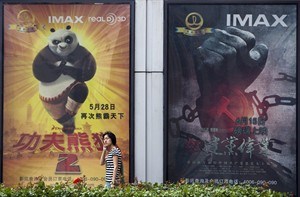
In this photo taken on June 15, 2011, a woman walks past movie posters of Hollywood movies "Kung Fu Panda 2," left, and China's propaganda film "Beginning of the Great Revival" on display side by side outside a cinema in Beijing. DreamWorks Animation and Chinese partners announced plans Tuesday, Aug. 7, 2012 to co-produce the next "Kung Fu Panda" movie and develop an entertainment district in Shanghai, expanding Hollywood’s fast-growing ties to China. (AP Photo/Andy Wong)
August 07, 2012 - 12:29 AM
BEIJING, China - DreamWorks Animation and Chinese partners announced plans Tuesday to co-produce the next "Kung Fu Panda" movie and develop an entertainment district in Shanghai, expanding Hollywood's fast-growing ties to China.
Hollywood studios have announced a flurry of deals with local partners to gain access to Chinese financing and a government-controlled film market that is growing strongly at a time of weak ticket sales in the United States and Europe.
"Kung Fu Panda 3" will be produced in China and released in 2016, according to DreamWorks Animation SKG Ltd. and its state-owned local partners — China Media Capital, Shanghai Media Group and Shanghai Alliance Investment.
They said the movie will be produced by a new joint venture, Shanghai Oriental DreamWorks Film & Television Technology Co. DreamWorks will own 45 per cent of the company and the Chinese partners will hold stakes totalling 55 per cent.
Oriental DreamWorks plans to release one to three films per year and employ as many as 2,000 production professionals, the partners said. They said it aims to become the largest animation production base in China and also will explore opportunities in online games, musicals and consumer products.
The planned entertainment district in Shanghai's Xuhui area, with investment of more than 20 billion yuan ($3.2 billion), will include cinemas, theatres, restaurants and tourist attractions and is due to open in 2016, the partners said.
They said the project is modeled on London's West End and Broadway in New York City.
China Media Capital, whose owners include state-run China Development Bank, owns a controlling stake in News Corp.'s China television channels and other assets. Shanghai Media Group operates television and radio broadcasters. Shanghai Alliance Investment is an arm of the Shanghai government.
Other studios including DreamWorks rival Walt Disney Co. have announced co-production deals in China and are adding Chinese elements to films to appeal to the growing local audience.
China's box office sales rose by one-third last year to $2 billion while revenue in North America, though still far larger at $10.2 billion, has fallen for two straight years.
Disney said in April the third installment in its "Iron Man" franchise would be co-produced with Beijing-based DMG Entertainment. DMG co-produced the thriller "Looper," starring Joseph Gordon-Levitt, Bruce Willis and Emily Blunt. It includes scenes filmed in Shanghai.
China's communist leaders want to build a globally competitive film industry and hope their studios can learn from Hollywood partners. They are trying to attract foreign studios to form joint ventures by promising more market access and a bigger share of ticket sales.
China has dozens of small, mostly anonymous companies that do animation work outsourced by foreign film studios and video game companies. Beijing wants to capture more of the profits by nurturing the growth of studios that can create their own popular characters and movie franchises.
The "Kung Fu Panda" movies, about a bumbling panda who becomes a martial arts hero, are hugely popular in China. They prompted debate about why a Hollywood studio was more successful than the country's own studios at creating a successful movie based on Chinese themes.
A key complaint among Chinese filmmakers is extensive government censorship and efforts to influence the content of movies.
Last year, Legendary Entertainment, producer of hits including "The Dark Knight," formed Legendary East with Chinese studio Huayi Brothers Media Corp. It plans one to two movies per year, mainly in English and based on Chinese themes.
Another studio, Relativity Media, said last year it would make movies with two Chinese partners for global audiences and distribute movies in China.
Foreign studios hope partnering with local companies will increase their access to China's tightly controlled film market.
For the past decade, China's state-run film distributors have allowed in only 20 foreign films per year for national distribution. The foreign share of ticket sales is limited to a range of 13.5 to 17.5 per cent.
In March, the government announced it will allow in an additional 14 foreign films if they are made in 3-D or for the big-screen Imax format. It raised the foreign share of ticket sales to 25 per cent.
___
DreamWorks Animation SKG Ltd.: http://www.dreamworksanimation.com
News from © The Associated Press, 2012